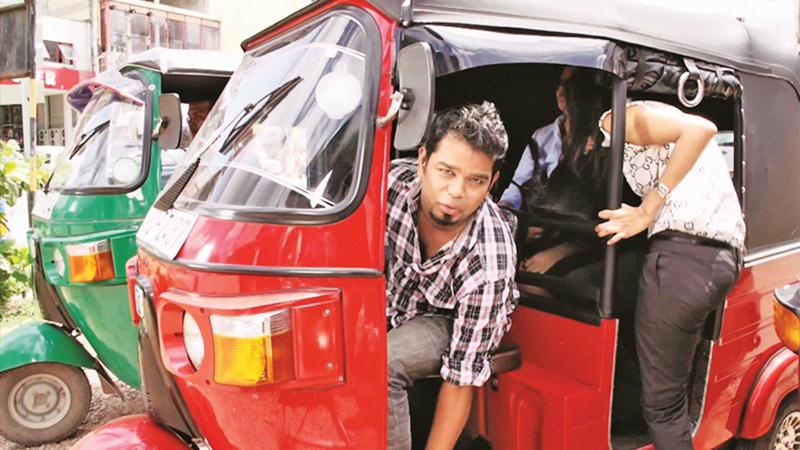
It was recently decided that the National Council for Road Safety will be turned into an Authority to regulate three-wheelers in the country soon. With more than 1.5 million three-wheelers in regular service around the country, this is a long overdue measure.
It was also reported that a series of driving regulations for three-wheelers will be introduced to ensure the safety of the passengers and road-users. This too is a laudable decision since during the past five years an average of 400 three-wheeler related fatal accidents per year have caused 360 deaths per year, on an average.
Attempting to regulate the three-wheeler industry has a long history. In 2013, regulations were gazetted as follows: Restrict the three-wheeler from transporting more than three passengers at a time; a speedometer and a fare meter were made mandatory; and the distance between the driver’s and the passenger’s seat was specified.
However, penalties have not been laid down for the breach of these rules. Although these rules were laid down, they were rarely implemented.
The Western Provincial Council gazetted its Motor Traffic Act twice, on special regulations which would control three-wheelers, but none of these have been implemented. The Road Passenger Transport Authority (Western Province) does not register three-wheelers despite the Act, and therefore, there is no regulatory body at present which register three-wheelers.
Adverse effect
Three-wheelers are considered by many as an appropriate mode of transport for developing countries. However, studies by some traffic analysts have revealed serious adverse impact on lane discipline by this mode of transport. These studies emphasize the disorder caused by three-wheelers on the flow of vehicular traffic in congested towns resulting in unsafe situations.
It shows that it is not only erratic driving practices by three-wheeler drivers, but its incompatibility with other vehicles creates dangerous and hazardous conditions in city traffic.
On the other hand, other analysts suggest three-wheelers should be the preferred mode of personal transportation, and be encouraged in urban areas. They believe three-wheelers can play an important role as para-transit modes in most cities and should be considered as public transport vehicles which can easily get passengers from one point to another.
They also point out that a three-wheeler needs just one parking place in the city and if it does 10 trips a day, it reduces the need for nine parking places. According to them, the three-wheeler is preferable to a car for a number of reasons.
First, it can carry the same number of people on an average, and takes only one half of the space used by a car on the roadway. Second, since its weight is one-third that of a car, it is responsible for less deterioration to the road, requires less tyre/rubber use, and takes one-third the national resources to produce. Therefore, three wheelers should be encouraged in urban areas.
Suggestions
In reality, three-wheelers play a key role in Sri Lanka’s public transport network, especially, after dark when buses stop operating or reduce their fleet.
Three-wheelers need to be promoted as the transport mode providing the “last mile connectivity” in the urban transport system. (Last mile connectivity is a term used in transportation planning to describe the movement of people and goods from a transportation hub to a final destination in the home.) They are ideal as intermediate public transport, a feeder system to public transport in large cities. A successful public transport system with high ridership requires a good network of three-wheelers. However, there are major concerns of commuter safety. The new regulations should address commuter safety and ensure that commuters are protected from undisciplined and unscrupulous drivers and their safety is assured.
There are a number of other issues which need attention:
Electronic taxi meters were made mandatory for all three-wheelers a few years ago. Yet, we come across vehicles without meters or with defunct meters.
Another point is to find out why school leavers see the three-wheeler industry as a unique sub-culture to gain employment. They choose the easy option of buying a three-wheeler on credit. Some have even got the licence. It is generally accepted that three wheeler drivers above 35 years are disciplined and take the job seriously. They are settled in life and do not take undue risks.
Accidents involving three-wheelers have reached an all-time high, causing concern even to the three-wheeler associations. In fact, they were the first to demand that licences be issued only to those above 35. This proposal should be taken into consideration.
It is estimated that about 10 per cent of the drivers are drug peddlers. This has prompted the Dangerous Drugs Control Board to submit a proposal to the President to bring in a law limiting the issuance of three-wheeler licences to persons over 35 years.
Also, three-wheeler parks near road intersections cause negative effects on road users and on the traffic flow. If a park is really necessary near intersections and if sufficient widths of the roads are available, the parking area should be at-least 100 metres away from the intersection along the minor road. Municipal Councils and permit issuing institutions should publish guidelines and regulations when issuing permits for locating three-wheeler parks. Most importantly, we need to discipline three-wheeler drivers. Today they are considered as a menace to safe road traffic.
There are many factors that contribute to reckless driving of three-wheelers, for example: driving without a licence and insurance, are not aware or show callous regard for traffic rules, overloading passengers, parking at unauthorised places, etc. Deterrent punishments should be meted out to violators by the Police and Courts.
A Code of Conduct should be prepared in collaboration with the three-wheeler associations, and the Authority empowered to take necessary action against violators of the Code.
